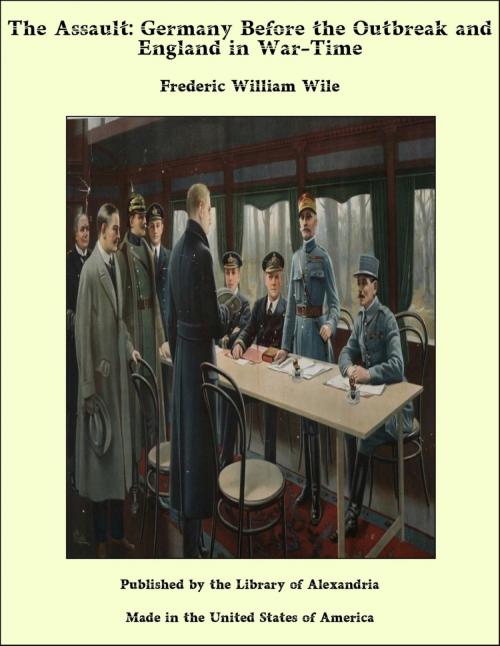The Assault: Germany Before the Outbreak and England in War-Time
Nonfiction, Religion & Spirituality, New Age, History, Fiction & Literature| Author: | Frederic William Wile | ISBN: | 9781465539434 |
| Publisher: | Library of Alexandria | Publication: | March 8, 2015 |
| Imprint: | Language: | English |
| Author: | Frederic William Wile |
| ISBN: | 9781465539434 |
| Publisher: | Library of Alexandria |
| Publication: | March 8, 2015 |
| Imprint: | |
| Language: | English |
It will hardly be possible for any faithful chronicler of that transcendent event to record that America's entry into the war set embattled Europe by the ears. The most such a historian can say of the impression created in Allied countries is that the abandonment of our neutrality toward the "natural foe to liberty" produced profound satisfaction but nothing in the way of a staggering sensation. Even in Germany and among her vassals, declaration of war by the United States failed to provoke consternation, although it was received in a spirit of nonchalance which was more studied than real. The Damoclean sword of Washington had hung so long in the mid-air of indecision that when the blow fell its effect was to a large extent lost upon beneficiary and victim alike. The peoples who became our Allies were gratified; the Germans mortified. But our leap into the arena stained with nearly three years of combatant blood was so belated that it seemed bereft of the power to plunge either our friends into paroxysms of enthusiasm or our enemies into the depths of despair. I am speaking exclusively of the first impressions generated by President Wilson's call to arms. In Allied Europe, as well as Germanic Europe, opinion is changing, now that the words of April are merging into the deeds of midsummer. Still different emotions will fire the breasts of both our comrades-in-arms and of the common foe when the full magnitude of American intervention dawns upon their reluctant consciousness. As yet the illimitable import of America's "coming in" is only faintly realized. Europe's attitude toward the new belligerent is too strongly intrenched in decade-old disbelief in the existence of American idealism and in gross ignorance of our actual potentialities for war, spiritual as well as physical, to be lightly abandoned. We shall have to win our spurs. There is at this writing no inclination whatever to present them to us on trust. In the introduction to the original edition of The Assault, which was completed at the end of 1915, I was un-neutral enough to utter the pious hope that Germany would be beaten. I confessed to the creed that "a victorious Germany would be a menace to international liberty and become automatically a threat to the happiness and freedom of the United States." I said that "my years in Germany taught me that"--years lived in closest contact with Prussian militarism long before it had taken the concrete form of savagery at sea. With that passion for corroboration of his own prejudices and predictions, which is inherent in the average man, and which dominates most writers, I rejoice to feel that our government and country have at length joined in liberty's fray from the identical motives which induced me at the outset to take the only side that it seemed possible for an American to espouse.
It will hardly be possible for any faithful chronicler of that transcendent event to record that America's entry into the war set embattled Europe by the ears. The most such a historian can say of the impression created in Allied countries is that the abandonment of our neutrality toward the "natural foe to liberty" produced profound satisfaction but nothing in the way of a staggering sensation. Even in Germany and among her vassals, declaration of war by the United States failed to provoke consternation, although it was received in a spirit of nonchalance which was more studied than real. The Damoclean sword of Washington had hung so long in the mid-air of indecision that when the blow fell its effect was to a large extent lost upon beneficiary and victim alike. The peoples who became our Allies were gratified; the Germans mortified. But our leap into the arena stained with nearly three years of combatant blood was so belated that it seemed bereft of the power to plunge either our friends into paroxysms of enthusiasm or our enemies into the depths of despair. I am speaking exclusively of the first impressions generated by President Wilson's call to arms. In Allied Europe, as well as Germanic Europe, opinion is changing, now that the words of April are merging into the deeds of midsummer. Still different emotions will fire the breasts of both our comrades-in-arms and of the common foe when the full magnitude of American intervention dawns upon their reluctant consciousness. As yet the illimitable import of America's "coming in" is only faintly realized. Europe's attitude toward the new belligerent is too strongly intrenched in decade-old disbelief in the existence of American idealism and in gross ignorance of our actual potentialities for war, spiritual as well as physical, to be lightly abandoned. We shall have to win our spurs. There is at this writing no inclination whatever to present them to us on trust. In the introduction to the original edition of The Assault, which was completed at the end of 1915, I was un-neutral enough to utter the pious hope that Germany would be beaten. I confessed to the creed that "a victorious Germany would be a menace to international liberty and become automatically a threat to the happiness and freedom of the United States." I said that "my years in Germany taught me that"--years lived in closest contact with Prussian militarism long before it had taken the concrete form of savagery at sea. With that passion for corroboration of his own prejudices and predictions, which is inherent in the average man, and which dominates most writers, I rejoice to feel that our government and country have at length joined in liberty's fray from the identical motives which induced me at the outset to take the only side that it seemed possible for an American to espouse.















